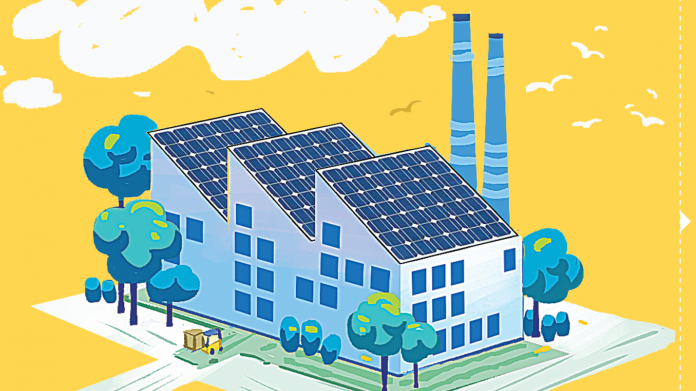A Green Shift: Rooftop Solar Solution are Loved by Industries
Summary:
In light of current trends, industries are shifting focus to alternative energy sources like solar power. This is happening even though national grid capacity exceeds demand by 25,000MW compared to the current 15,000MW.
Content:
Several big companies have already switched to solar power partially or are considering it. They’re finding that using solar panels on their roofs is a smart choice because it’s reliable and cost-effective. Companies can also get financing more easily for this type of solar power. This method of using solar power is relatively new, but it’s getting more popular because it can save companies money on their energy bills and even earn them money by selling excess power back to the national grid.
Also, Some major industries in Bangladesh are investing in rooftop solar power projects. Meghna Group of Industries is investing Tk100 crore for a total capacity of 23MW, while Bitopi Group’s Tarasima Apparels and Fakir Fashions are installing 3.57MW and 1.68MW respectively. Viyellatex Group and Pacific Jeans Group are also installing solar on their rooftops, while Giant Group is currently in negotiations to do the same.
Solar power solution providers offer different financing models for businesses to switch to solar power. The OpEx model allows users to pay a monthly tariff comparable to their national grid bills, while the CapEx model requires users to bear all costs upfront. The capital lease financing model involves a developer company lending money to users, which is repaid with interest over five years. Many industries are exploring these financing models to install solar power on their rooftops, with the OpEx model being the most preferred. However, it is risky for developers as industries may default and become bankrupt. Omera Solar aims to set up 200MW of rooftop solar systems by 2025, while state-owned Idcol aims to install 300MW rooftop solar systems by the same year.
Rooftop solar power is increasingly popular due to net energy metering and electricity price hikes. However, the Russia-Ukraine war has disrupted supply chains and caused commodity prices to rise, leading to revised fuel and gas prices. Despite challenges, industries are exploring solar energy to combat intermittent power supply issues, with demand for rooftop solar rising among industries. Overall, it’s an attractive and viable option for reducing costs and ensuring a stable source of energy.
Rooftop solar power can save users 30%-40% compared to grid electricity tariffs. Three small industries in Chattogram are saving Tk3-4 lakh per month with rooftop solar power systems. The potential for rooftop solar power in Bangladesh is enormous, with the ability to generate 5,000MW in the next five years.
Saudi and Bangladeshi companies plan to build the largest solar power plant in Bangladesh for $430 million. Foreign companies are interested in renting rooftops of factories and warehouses to install solar power systems. Teesta Solar Ltd and Energon Renewables Ltd have also opened large solar production plants in the country.
Bangladesh relies heavily on imported primary fuel sources for its power sector, with natural gas and LNG accounting for over 50% of electricity production. Coal and heavy fuel oil contribute to a significant portion of power generation, while solar energy represents only 1.84% of installed capacity. The Russia-Ukraine war disrupted the global supply chain, leading to a rise in commodity prices and prompting the government to revise fuel prices. Industries are seeking alternative sources such as solar energy due to intermittent power supply issues.
Picture and Article Source: The Business Standard


Leave a Reply